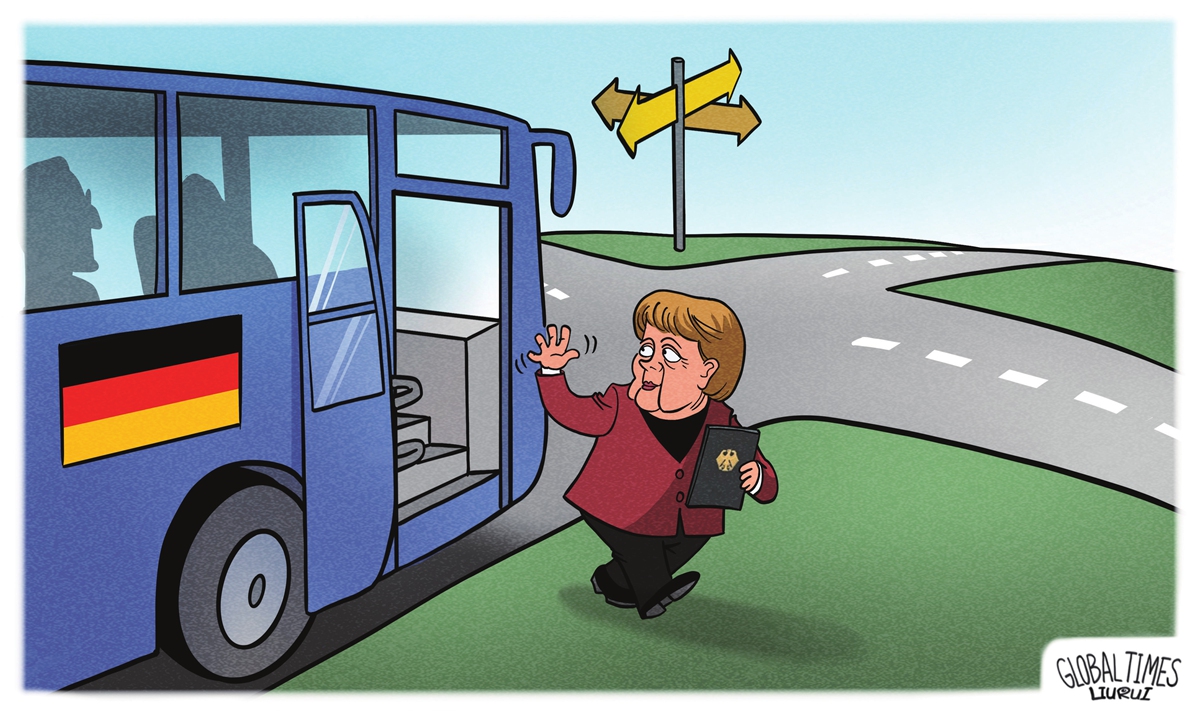
End of Merkel era Illustration: Liu Rui/GT
It’s an end of an era, Chinese netizens said as they bade farewell to Angela Merkel, whose 16 years as German chancellor have come to an end. Many hailed “auntie” Merkel as one of the most “outstanding and pragmatic” Western leaders, while others expressed caution about where China-Germany ties will go from here.
Videos of a ceremony honoring Merkel, featuring an eclectic mix of music personally selected by the chancellor herself, showed her emotional final speech in which she urged Germans to get vaccinated against COVID-19. The videos have been trending on Chinese social media platforms.
Germany's parliament will officially elect Olaf Scholz as the country's next chancellor on Wednesday, bringing the curtain down on Merkel’s 16-year rein. “She is widely respected because she possesses the most valuable qualities of a person and a politician: humility, pragmatism, responsibility and gratitude. As one of the most outstanding politicians in the West, her departure truly marks the end of an era,” said one Sina Weibo user.
The Chinese public have a favorable view of Merkel mainly because her pragmatic China policies not only brought palpable benefits for Germany but also for China, Jiang Feng, a research fellow at Shanghai International Studies University, told the Global Times.
The expert said that especially during turmoil in the global geopolitical context and rising populism in Western countries, Merkel’s programmatic policies also served as an effective counterbalance against those trends.
Merkel visited China 12 times during her long reign as chancellor and she is also known as the “Western leader who knows China the best.” Apart from metropolises such as Beijing and Shanghai, she also visited cities such as Xi’an, Chengdu, Hefei and Shenyang. During those visits, the chancellor not only held profound communications with Chinese leaders and visited German invested factories, but she also learned to cook local spicy food in Chengdu, tasted beer brewed by Chinese and German students in Anhui, and taught students in rural schools mathematics, according to media reports.
“When I became chancellor, China’s GDP of $2.3 trillion was slightly lower than Germany’s $2.8 trillion,” Merkel said in an interview with German newspaper Suddeutsche Zeitung in October this year. “Today, China’s GDP is $14.7 trillion, and ours has grown to $3.8 trillion.”
She noted that although Germany is still a relatively rich country, it is playing a smaller role internationally as the global balance has shifted. So it is important for Germany to establish a relationship with China in a strategically wise way, said the chancellor.
China-Germany ties have not always been plain sailing. The relations nosedived when Merkel met the Dalai Lama in 2007. Relations improved after that as the two countries’ economic cooperation deepened. Analysts also said Merkel served as a “mediator” in tensions between China and the West.
“She wasn’t eager to comment whenever China had divergences with the West. Instead, she tried to learn the differences in systems and practices between China and the West, to solve the problem with all parties,” said Jiang.
Chinese netizens are also eager to see where the bilateral ties will go under Germany’s new government.
Media reports said that Chancellor-elect Olaf Scholz has conveyed to Beijing that he wants to continue Angela Merkel's China policy. Yet in a relatively hostile gesture, incoming German Foreign Minister Annalena Baerbock urged a tougher stance against Beijing during a recent interview. China's embassy in Berlin responded by saying the world needs "bridge builders instead of wall builders."
These new officials know little about China or the complexity of China-Germany relations, said Jiang, noting that hawkish remarks are partly trying to cater to voters’ opinions.
He admitted that the bilateral relations will see a certain amount of turbulence after the new government takes office, but China is prepared for the turmoil and ready to cope by enhancing communication.
“What Merkel has proved is that Western powers and China can find common ground while shelving differences, and achieve close cooperation via positive and effective communication,” said Jiang.

